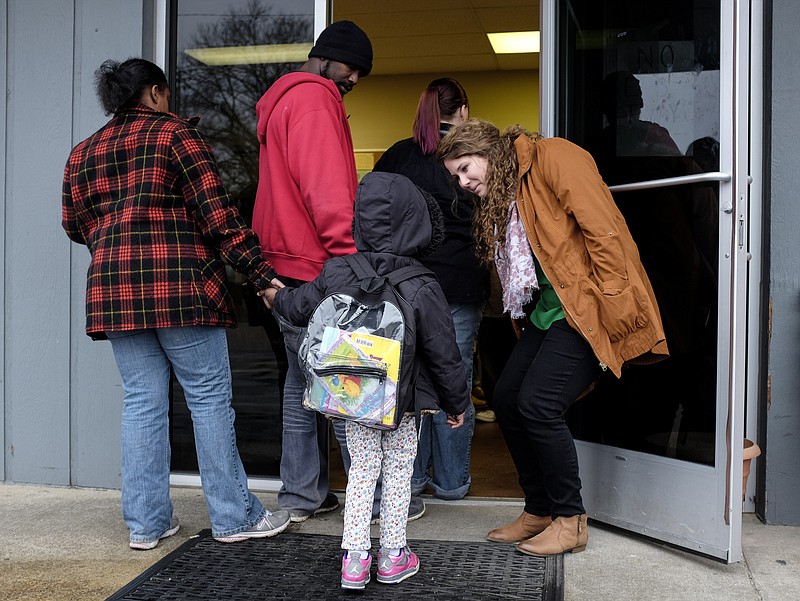More Info
The Poverty Puzzle starts today on Page A1. Stories will run Wednesdays and Sundays through March 27.
More online
Please visit timesfreepress.com/povertypuzzle for a comprehensive multimedia presentation that includes additional videos, graphics and multimedia elements.
In 2015, the Chattanooga Times Free Press poured an unprecedented amount of time and energy into researching the roots of and solutions to Chattanooga's economic reality; we made this investment as other regional news outlets were pulling back from long-term reporting projects.
Initially, the idea behind The Poverty Puzzle series was fairly cliché: the tale of two cities. Chattanooga had been getting a significant amount of positive attention nationally, but on the ground, our reporters saw another story unfolding.
After the Great Recession, poverty increased among all ethnic groups in the city, its outlying suburbs, the rural pockets of Hamilton County and the greater metro area. What our reporters learned after more than a year of reporting was that poverty had become a symptom of huge societal shifts, happening unnoticed by most, including us.
And that got us thinking. How many of us actually pay a lot of attention to the poverty in our city? Sure, we see it when we drive by someone sleeping on the sidewalk, a not-uncommon sight in Chattanooga. Or we notice it when we drive through a neighborhood that has seen better times. And we see panhandlers with cardboard signs standing at intersections seeking a handout. But we quickly forget, lost in our own lives.
Truth is, poverty usually doesn't directly affect most of us unless someone we know (maybe us) is laid off and finds it hard to land another job. Or perhaps someone in our family is hard hit by medical expenses and faces not having enough money, too many bills and a genuine fear of losing their home. Suddenly, poverty becomes very real.
In our reporting, we discovered that our region, state and city are being crippled by powerful forces that aren't being discussed publicly. Chattanooga can certainly boast about its good numbers: lower unemployment, job growth in high-paying fields, low taxes and relatively low cost of living. But there are other numbers and cutting-edge research being ignored that will matter greatly to the area's residents in the years to come.
City boosters sell the tale of a downtrodden city that reclaimed its prominence, and the city's story is certainly impressive. But we found a new challenge barrelling toward us and those paying attention knew what was coming. So The Poverty Puzzle expanded as we realized how complex the issue is.
A typical series on poverty focuses on the struggle of the poor, and you will find those diverse voices in the series. What you also will find in this newspaper and online is a focus on the people and approaches focused on change. We worked with the Solutions Journalism Network, a New York-based nonprofit organization, to craft ways to tell stories that don't just present a societal problem but also offer a solution. Our reporters studied programs that actually work to help people climb out of poverty. Some of those programs are underway in our community.
We sought to not only offer human stories of hardship and triumph but also a collection of the most well-respected and nonpartisan thinking on the economic, social and cultural issues surrounding poverty. We talked with some of the brightest minds in academia and traveled out of state to talk with those facing similar challenges, hoping to bring home insights and share what we learned.
We understand that poverty is a politically sensitive topic and that who we interviewed for the series mattered. So we reached out and built relationships with people on all sides of the issues - rich, poor, conservative, liberal, those who believe finding a solution to poverty is a societal obligation and those who think it's an individual's responsibility. We hope you will see balance and fairness in this series in the coming weeks.
You may think this series is not for you because, as we wrote, poverty may not affect you now. But there is a high likelihood that, in the coming decades, it will affect your community or neighbors. If nothing is done on a local level, even those who remain economically secure in this region will feel the effects of poverty - maybe they won't be able to find qualified employees for their business or they'll find their family zoned for a school with high poverty numbers and low test scores. So please read the series, but don't stop there. This is a problem that requires neighbor-to-neighbor conversations and neighbor-to-neighbor change.
As a newspaper, we can educate, moderate and hold people accountable. But the ideas, passion and execution must come from the community.
Alison Gerber is editor of the Chattanooga Times Free Press. Reach her at agerber@timesfreepress.com or 423-757-6408 and @aligerb.
